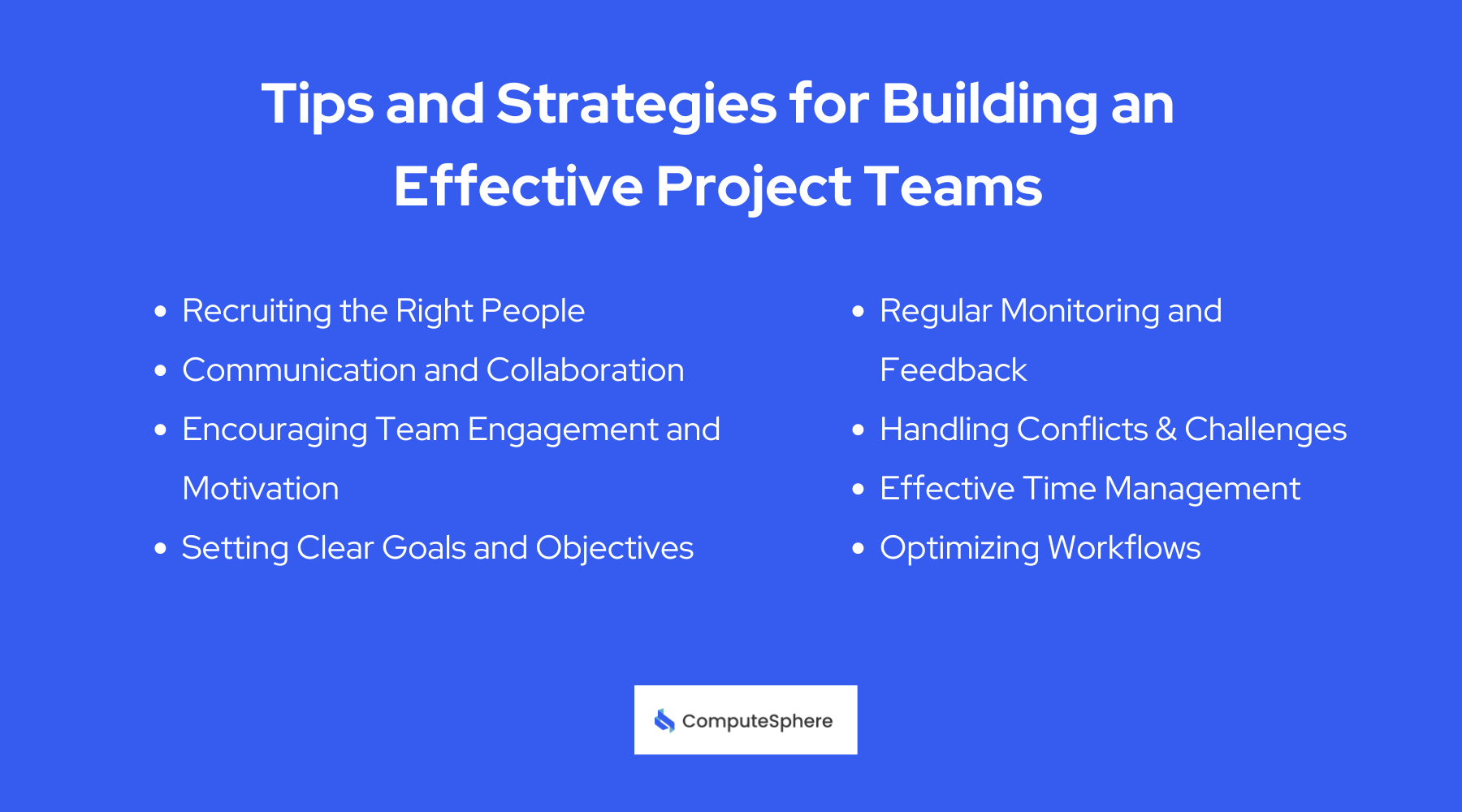Building an Effective Project Team: Tips and Strategies

A successful project is more than just determined by its goals, budget, or timeline. It heavily depends on the strength and effectiveness of the project management team. Building a capable and skilled project management team is crucial to ensure proper planning, smooth execution, effective communication, and effective outcomes.
Here are some tips for building an effective project team. We'll cover selecting the right team members, fostering effective communication, and cultivating a collaborative environment.
Project managers can create a high-performing team that promotes project success by applying these principles.
Defining Team Roles and Responsibilities
Clearly define roles and responsibilities to build an effective project team. Each member should understand their duties and how their role contributes to the project. For example, in a software development project, key roles might include project manager, developers, QA testers, and UX/UI designers. Clear roles reduce confusion and increase efficiency.
Assessing Team Skills and Competencies
Before building your team, assess the skills and knowledge of potential members. Understand their technical skills, experience, and soft skills. A diverse skill set allows for better problem-solving and innovation. Conduct a skills assessment to identify strengths and weaknesses, ensuring the right mix of talents to achieve your project goals.
Tips for Building an Effective Project Team

Recruiting the Right People
Recruiting the right people is the first step in building a successful project team. Look for individuals who not only possess the necessary technical skills but also align with the project’s goals and values.
During the recruitment process, consider using behavioral interviews to gauge how candidates handle challenges and work within a team setting. Additionally, prioritize diversity in your team composition to bring different perspectives and ideas, which can drive creativity and innovation.
Communication and Collaboration
Effective collaboration and communication are essential for team success. To enhance communication, establish regular team meetings and use collaborative tools like Slack or Microsoft Teams.
These platforms facilitate real-time communication and ensure that everyone stays on the same page. Encourage open dialogue where team members feel comfortable sharing ideas and feedback. As a result, innovation can flourish in a collaborative environment.
Encouraging Team Engagement and Motivation
Keeping your team motivated and engaged is crucial for maintaining high performance. Regularly recognize and reward contributions to show appreciation for hard work. This could be through verbal acknowledgment in meetings, small incentives, or more formal recognition programs.
Additionally, provides opportunities for professional development and career growth. When team members see a clear path for advancement, they are more likely to stay motivated and committed to the project’s success.
Strategies for Managing Team Performance
Setting Clear Goals and Objectives
To guide your team effectively, set clear, achievable goals and objectives from the outset. These should be SMART: specific, measurable, attainable, relevant, and time-bound. Clear goals provide direction and purpose, helping team members understand their targets. Communicate these goals regularly and align them with overall project objectives to maintain focus.
Regular Monitoring and Feedback
Regularly monitor team performance and provide constructive feedback for continuous improvement. Use project management tools to track progress and identify deviations. Schedule performance reviews to discuss successes and areas for improvement. Focus feedback on behaviors and outcomes to help team members improve and grow.
Handling Conflicts and Challenges
Handling Conflicts and Challenges Address conflicts proactively to keep your project on track. Encourage open communication and create a safe space for expressing concerns. Use mediation or negotiation to resolve conflicts and find mutually acceptable solutions. Effective conflict management maintains a positive team dynamic and project momentum.
Effective Time Management
Implement effective time management strategies to meet project deadlines. Use time blocking and project management tools like Gantt charts to visualize timelines and dependencies. Encourage prioritizing tasks based on importance and urgency to ensure critical milestones are met on time.
Optimizing Workflows
Streamline workflows to enhance productivity. Identify bottlenecks and inefficiencies in current processes and implement changes to optimize them. Automate repetitive tasks and improve communication channels. Foster a culture of continuous improvement, encouraging regular review and refinement of processes.
Conclusion
Building an effective project team requires careful planning, clear communication, and ongoing effort. From defining roles and responsibilities to promoting collaboration and managing performance, each step plays a crucial role in the overall success of the project. By implementing the tips and strategies discussed in this blog, you can create a cohesive, motivated, and high-performing project team.
Contents
Built for Builders. Priced for Startups.
Tired of unpredictable cloud bills? ComputeSphere offers modular, fixed-cost cloud hosting that grows with your startup—no DevOps headaches, no surprises.
Get StartedShare this article
Browse Some Related Blogs
Relevant and related contents you can read









